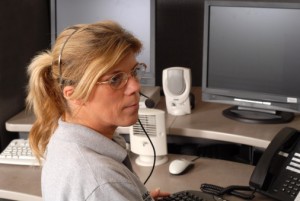By Mark Bond, professor of Criminal Justice at American Military University
Today’s 911 call centers are staffed 24 hours a day, 365 days a year with police and fire dispatchers and 911 call takers. These dedicated professionals are the lifeline for police and fire personnel dispatched to emergencies.
In 1967, President Lyndon Johnson’s Commission on Law Enforcement and Administration of Justice recommended that police departments have a single number for the public to call when they need police services. In 1968, Haleyville, Ala., became the first city in the United States to start using the 911 system. During the next several years, the 911 emergency phone system rolled out across the United States with a campaign to educate the public to dial “9-1-1” to report an emergency.
Nonstop Stress for Dispatchers

When citizens call 911, they are often panicking because they are in an emergency and need police or fire service immediately. The 911 call taker is trained to stay calm and speak in a clear tone, get the address and nature of the call, and make an immediate decision so he or she can electronically code the call in the CAD system for dispatch.
The pace is nonstop, and seldom is there a break in the action before the next 911 call comes into the center. The stress can be overwhelming, even for seasoned and resilient emergency dispatchers.
[Related Article: The Impact of Stress and Fatigue and Steps to Control It]
Research on the Stress
In 2012, professors Heather Pierce and Michelle Lilly from Northern Illinois University completed a study and published their work to the Journal of Traumatic Stress. The title of their research article is “Duty-related trauma exposure in 911 telecommunicators: Considering the risk for post-traumatic stress.”
The study found that 911 call takers and emergency dispatchers reported significant emotional distress directly related to handling emergency calls for help, and the repeated exposure has increased their risk for developing post-traumatic stress disorder (PTSD).
This does not indicate that those working in 911 centers are going to develop PTSD, it only means they are in a higher risk category. Local and state governments have a responsibility to make sure that professional mental healthcare providers are available to serve not only police officers, firefighters and paramedics, but also 911 call takers and emergency dispatchers. Without them, no emergency lifeline would be possible for citizens or first responders.
About the Author: Mark Bond worked in law enforcement and has been a firearms trainer for more than 29 years. His law enforcement experience includes the military, local, state, and federal levels as a police officer and criminal investigator. Mark obtained a BS and MS in Criminal Justice, and M.Ed in Educational Leadership with Summa Cum Laude Honors. As a lifelong learner, he is currently pursuing a doctoral degree in education with a concentration in distance education. Mark is currently an assistant professor of criminal justice at American Military University & American Public University and is one of the faculty directors in the School of Public Service & Health. You can contact him at Mark.Bond@mycampus.apus.edu.